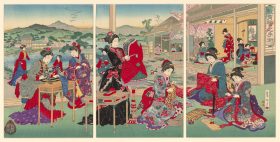Photo by Matthew LeJune on Unsplash.
‘Yes, but do the graduates actually get jobs?’ It’s a question those teaching the next generation of arts, cultural and creative producers often hear.
On ArtsHub recently David Williamson has highlighted the ‘python squeeze’ on university arts programs, while Robyn Archer has argued for vocational training and Andrea Hull has highlighted concerns about the effect of TAFE cuts on arts careers. The public probably cannot be blamed for being a bit dubious about the true value of university arts degree programs. Again and again we hear of troubles on the horizon. Our degrees are not vocational enough. Our degrees are not cost-effective enough. Our degrees are not compatible with new teaching technologies.
Having spent a decade teaching in TAFE and tertiary courses in the arts, I must confess to a sense of confusion about why so many people still doubt the worth of a university degree in drama, dance, music, visual arts, graphic arts, design, games, or perhaps an interdisciplinary mix of a number of these art forms.
Do you never watch TV? Do you never buy CDs, DVDs or digital downloads? Do you never take your children to a theme park, street party, Christmas Carols or similar community event? Do you never buy tickets – not just to plays, performances and concerts billed as such but to sporting events that feature some sort of entertainment for spectators? Do you take your children out of those classes in which their teachers ask them to speak, sing, move or make images in anything beyond a functional, informational way?
Do you think these sorts of things spring up spontaneously, without the investment, energy and effort of talented people in the government, not-for-profit and for-profit arts to create, produce and promote them?
It is tempting to issue our critics a challenge. Try – for a day, a week, a month at most – to switch off from all the art forms that celebrate, critique or otherwise document the characters and characteristics that populate the Australian cultural imaginary. Then see how socially literate, lively or functional one feels without stories, storytelling and creativity as a central components of our human existence.
The problem, perhaps, is not so much the perception that the arts are not important to Australia’s social fabric, but the perception that a university education in the arts prioritises theoretical, conceptual or contextual learning at the expense of technical training in how to stage a play, performance or concert.
There is a view, in some quarters, that the arts is best learnt not through talking but through doing – and thus that ‘academics’ is a poor substitute for talent, technique and skills training in the arts (and in selecting students for training in the arts).
This may be true – but when it comes to making a life in the arts with long-term benefits for the individual, the culture, and the economy this is not necessarily the whole truth
In most university programs students do – often to their surprise – spend as much time studying the historical, ideological and industrial frameworks that surround their artform as they do on the technical, tasked-based skills that they more traditionally associate with employability. It can be a source of anxiety to students too as they wonder whether they would be better trained in a a more traditional, vocational, or apprenticeship context.
The issue with this view is, of course, that it totally overlooks the fact that today’s arts graduates go to work in a fast changing field in which new trends, technologies and uses for their skills are always just around the corner. To be successful in what will almost certainly be a portfolio career, the current generation of arts, cultural and creative producers need more than just technical or task skills to survive and to thrive. They need meta-level skills that allow them to see their skills in context, strategise, improvise, and switch between niches as new styles, markets and technologies change the landscape in which their creativity and their creative career unfolds. The ability to acknowledge, adapt to and take advantage of changing trends is key to a sustainable career.
Do arts graduates get jobs? Yes, they do. Like most of my colleagues, I could fill a forest worth of paper listing the fantastic things my graduates have done – from performing, directing and playwrighting through to putting together events, festivals and exhibitions, founding extra-curricula programs for young people, facilitating programs for people with disabilities, refugees or other marginalised members of the community, and even writing the governmental arts, culture and leisure policies that inform how their fellow creatives’ work is funded.
Yet, when I think about it, what is most heartening is the way university graduates generate new work, and new work roles, far beyond the aspirations their teenage selves might have had in mind. A combination of practical and contextual studies shows students just how constantly artforms, audiences, and the support structures that bring them together change. It gives them confidence to improvise, come up with new ideas, commit themselves to the lifelong learning necessary to follow through with each new ideas, and even enjoy the challenges of this process. This is a confidence graduates less literate in the ideological and industrial contexts in which they operate may lack.
The young people graduating from today’s arts degrees are not equipped with every skill they will ever need. They do, though, learn how to learn, and how to continue learning throughout their lives, eliminating any worry that their world will end when a skill or style they have struggled to learn suddenly fades from favour.
The most successful arts graduates have the energy, entrepreneurialism and above all resilience to come up with new practices, and new platforms for practice, to suit new technologies, new spectators, new social milieus, or any other new demand that might one day come over the horizon. Their careers may take more twists, turns and detours than the average medical, engineering or education graduate, especially in the early years, but it is difficult to see the arts graduates distinctive blend of aptitude and adaptability as anything other than a boon to themselves and to society.





